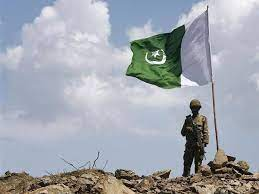Pakistan’s military is contemplating a new offensive against Tehrik-i-Taliban Pakistan (TTP) and its associated factions. Prime Minister Shehbaz Sharif held two rounds of the National Security Committee (NSC) meeting with senior civilian and military leaders to devise a strategy against the terrorist organisation. The official statement from the NSC meeting stated that “Pakistan’s security is uncompromisable, and the full writ of the state will be maintained on every inch of Pakistan’s territory.” A military offensive against TTP may further strain Pakistan’s already struggling economy and exacerbate tensions with the Afghan Taliban.
Furthermore, Pakistan is seeking support from the international community, particularly the United States (US), on the TTP issue. It will probably help Islamabad to exert pressure on the Afghan Taliban and to legitimise its counterterrorism campaign against anti-Pakistan terror organisations that are purported to be operating from within Afghanistan.
Debating an offensive
The recent surge in militancy led by TTP in Pakistan began after the Taliban’s takeover of Afghanistan in August 2021, which Pakistan had perceived as a major achievement of its “strategic depth” policy. However, since then, TTP has substantially augmented its presence in the country, particularly in the tribal districts of Khyber Pakhtunkhwa province, and has been attacking Pakistan’s security forces with impunity. While previous military operations against TTP between 2007-2010 were largely confined to the erstwhile Federally Administered Tribal Areas (FATA) region and the Swat Valley, it seems that Pakistan is now contemplating to conduct cross-border strikes in Afghanistan.
On 30 December, Interior Minister Rana Sanaullah told a news channel that Pakistan may target TTP militants in Afghanistan if the authorities in Kabul do not take any action against them. Defense Minister Khawaja Asif also stated that “Afghanistan’s soil continues to be used against Pakistan, despite an agreement.” These statements have exacerbated tensions with the Afghan Taliban. In response, the Afghan National Defense Ministry released a statement on 1 January stating that it “views Pakistan Interior Minister Sanaullah’s statement about the presence of TTP in Afghanistan and possible attack as provocative and baseless.” The statement also said that Afghanistan is “ready to defend its territorial integrity and independence” and knows how to do so.
The NSC conveyed an indirect warning to the Afghan Taliban that Pakistan will not tolerate its neighbouring nation granting sanctuary and aid to terrorists. The statement said, “the forum concluded that no country will be allowed to provide sanctuaries and facilitation to terrorists and Pakistan reserves all rights in that respect to safeguard her people,” without specifically identifying Afghanistan.
The Tehrik-i-Taliban Pakistan (TTP) and its affiliated groups conducted 367 attacks in 2022 across different parts of the country, primarily in the Khyber Pakhtunkhwa (KPK) province. In December, the terrorist group carried out a rare suicide attack at a police checkpoint in Islamabad, resulting in the death of one officer and the injury of 10 people. In another incident, TTP militants targeted a Counter-Terrorism Department in Bannu and took several police officers hostage for multiple days. The recent spike in terror incidents was prompted by TTP’s formal declaration to terminate an “indefinite” ceasefire with Pakistan on 28 November and instructing its fighters to launch attacks across Pakistan. The Islamabad suicide bombing and the killings of two Pakistani intelligence operatives on 3 January, including one deputy director-level officer in the Inter-Services Intelligence (ISI), in Punjab have raised concerns that TTP is extending its reach beyond KPK.
More importantly, TTP issued an explicit warning to the ruling political parties, Pakistan Muslim League-Nawaz and Pakistan Peoples Party, threatening to attack their leadership for “announcing war against the outfit to please America.” The terror outfit further claimed that a large portion of the tribal areas in Pakistan are already under TTP’s control and that there is no need for them to use Afghan soil for their operational purposes. In an attempt to expand its countrywide influence, TTP has even formalised tactical alliances with a few Baloch rebel groups in Balochistan, which further aggravates security challenges for Pakistan military.
In a direct threat to Pakistan’s sovereignty, TTP announced new appointments last month, dividing the group into various “ministries” such as Defense, Judiciary, Information, Political Affairs, among others. The terror outfit is following the Afghan Taliban’s model of running a parallel or shadow government, thereby confirming its expanding presence in KPK and other adjacent areas. According to Interior Minister Sanaullah, the estimated number of TTP militants in the Pakistan-Afghanistan border region ranges between 7,000 and 10,000.
In contrast to previous military campaigns against TTP, Pakistan may encounter a variety of obstacles in defeating the terrorist organisation this time. TTP militants are highly motivated and well-trained following the perceived “victory” of the Afghan Taliban. But, more importantly, the withdrawal of foreign troops, especially the US, from Afghanistan could significantly impact the operational capabilities of the Pakistan military in the field.
US support to Pakistan
To legitimise its offensive against TTP and operations beyond the so-called Durand Line, Pakistan is seeking assurances of support from foreign countries. The US State Department released a statement on 3 January 3 expressing support for Pakistan’s right to “defend itself from terrorism” and recognizsng that the Pakistani people have “suffered tremendously” from terror attacks. This statement was one of many from Washington on the evolving security situation in Pakistan. As part of a potential quid pro quo arrangement for aiding the US in withdrawing troops from Afghanistan in August 2021, Washington may provide military or financial aid to Pakistan in its counterterrorism campaign against TTP.
The relationship between the US and Pakistan has improved in the past eight months after it experienced a significant downturn following the accusations of alleged US interference in Pakistani politics by former Prime Minister Imran Khan. It is worth noting that despite the tensions caused by the Imran Khan issue, the bilateral military ties between the two countries remained relatively robust. On December 14, General Michael “Erik” Kurilla, the Commander of US Central Command, visited Pakistan to assess the security situation along the Pakistan-Afghanistan border and explore ways to enhance the ‘military-to-military’ relationship with the new Army chief, General Asim Munir.
Washington is concerned that the security void created in Afghanistan following the withdrawal of foreign troops in August 2021 has enabled global terrorist organizations, such as al-Qaeda (AQ) and the Islamic State, to operate with greater freedom and expand their operations. The killing of AQ leader Ayman al-Zawahiri last year in a US drone strike in Kabul further affirms these fears. Consequently, the United States is increasing security cooperation with Pakistan to monitor the activities of various transnational terror groups believed to be operating in Afghanistan and to possibly enhance its ‘over-the-horizon’ counterterrorism capabilities in the region.
What is in the offing?
Despite several rounds of negotiations led by Lieutenant General (Retd.) Faiz Hameed for several months, both as the head of ISI and Corps Commander Peshawar, Pakistan’s security establishment failed to secure a peace deal with TTP. With the new army chief in Pakistan, it appears that TTP has deliberately adopted a more assertive posture and is currently unwilling to partake in further peace talks. Therefore, given the absence of any dialogue and daily attacks on security forces, General Munir may consider either a full-fledged military offensive or TTP-focused Intelligence Based Operations (IBOs) across Pakistan, and possibly in eastern Afghanistan.
A military operation may lead to serious repercussions for Pakistan’s economy, which is already facing challenges with forex reserves plummeting to an eight-year low. However, it may help the military establishment to rebuild its damaged reputation after facing unprecedented public backlash following the highly contested removal of Imran Khan from power in April 2022. Additionally, Pakistan may hope to garner global support, particularly from the West, and financial aid on the pretext of its war on terrorism.
Lastly, the escalating security turmoil in Pakistan is also a cause of concern for India, as it poses a threat to regional stability. Terrorist organisations based in Pakistan, such as Jaish-e-Mohammad, Lashkar-e-Tayyaba, and Al-Badr, may be more inclined to carry out acts of aggression in Jammu and Kashmir due to this instability. Moreover, General Munir has yet to clearly articulate his India policy. His initial statements did not instil confidence in New Delhi. There are concerns that the current status quo between India and Pakistan may be jeopardised in the absence of any dialogue, including backchannel talks, amidst increasing chances of cross-border terror activities in J&K and Punjab.



